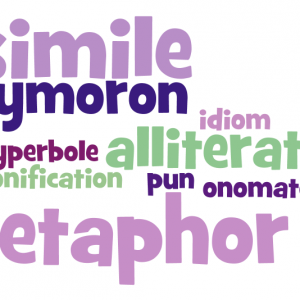Introduction to Figurative Language
When you describe something by comparing it to something else, this is figurative language. the other term for it is figures of speech.
Literal and figurative language differ from each other in that literal language refers to words that do not deviate from their defined meaning. Non-literal or figurative language refers to words, and groups of words, that exaggerate or transform the accepted meanings of some or each of the words.
common forms of figurative language
 Simile
Simile
A simile uses the words “like” or “as” to compare one object or idea with another, the implication being that they are alike.
Hungry like a wolf
Metaphor
The metaphor states a fact, or draws a verbal picture by the use of comparison. A simile would say you are like something; a metaphor is more absolute. The meaning is obvious from the visual clue that the metaphor offers.
Garbage in, garbage out.
Miss the boat
Personification
A figure of speech in which human characteristics are given to an animal or an object.
My teddy bear gave me a hug.
Alliteration
The repetition of the same initial letter, sound, or group of sounds in a series of words. Alliteration includes tongue twisters.
She sells seashells by the seashore.
Onomatopoeia
The use of a word to describe or imitate a natural sound or the sound made by an object or an action.
snap crackle pop
Hyperbole
An exaggeration that is so dramatic that no one would believe the statement is true. Tall tales are hyperboles.
He was so hungry, he ate that whole cornfield for lunch, stalks and all.
Idioms
According to Webster’s Dictionary, an idiom is defined as: peculiar to itself either grammatically or in having a meaning that cannot be derived from the conjoined meanings of its elements.
Monday week for “the Monday a week after next Monday”
Cliché
A cliché is an expression that has been used so often that it has become trite and sometimes boring.
Many hands make light work.
Figurative language refers to words, and groups of words, that exaggerate or transform the accepted meanings of some or each of the words.



















